“Let’s play hockey.”
The chant rang out loud and clear on the Yale side of the Payne Whitney Gymnasium on Friday night in New Haven, Conn. as the Harvard men’s basketball team closed in on a third straight outright Ivy League Championship. A couple of blocks away at Ingalls Rink, however, the Bulldogs were in the process of thoroughly dismantling the Crimson, 4-0, in game one of the first round of the ECAC Men’s Hockey Tournament.
The pecking order of Harvard’s Big Two winter teams was in sharp focus this week. While men’s basketball opened SportsCenter the next morning as the first team in the country to punch its ticket to March Madness, men’s hockey fell in the first round of its conference tournament for the second straight season.
In the lead-up to this past weekend, SB Nation published a long-form feature on men’s basketball coach Tommy Amaker, in which writer David Tannenwald explores the social impact that Amaker’s squad has had on Harvard. Since Amaker arrived from Michigan in 2007, the Crimson’s following has grown rapidly—so much so that University President Drew G. Faust has reportedly described home men’s basketball games at Lavietes Pavilion as “the most diverse event on Harvard’s campus.”
But once upon a time, men’s hockey was the school’s social touchstone. In the late 1980s, legendary coach Bill Cleary ’56 and his team packed the Bright Center weekly as the Crimson made reaching the Frozen Four a near-annual tradition. Students stood in long lines across the Yard for ECAC Tournament tickets in 1989, the year Cleary's kids took home Harvard's first NCAA team title in any sport.
The icemen developed a committed undergraduate fan base, led by the infamous and masked “Harvard Hares.” The Hares traveled well, outshouting opposing crowds up and down the Northeast.
This week, I don’t think I saw any Harvard Athletics promotions to bus students down to New Haven for a hockey game. I certainly didn’t see any masked rabble-rousers at Ingalls.
A question for the Harvard men’s hockey team as it enters the offseason is whether this pecking order is truly a New Harvard Athletics World Order, or just a passing fad. The Crimson skaters will begin to decide that question for themselves next year.
When Harvard’s young guns retake the ice next October, they will not be so young. The Crimson’s beleaguered bench backers and highly-touted prospects will face more pressure than ever before to prove that prep school and junior league ringers can consistently develop, excel, and win in Cambridge.
Harvard’s reputation as a men’s hockey school is at stake. Since 2007, Amaker has out-recruited the competition. Men’s hockey coach Ted Donato ’91 has, too. I don’t care what you say about Academic Index or Tom Stemberg conspiracy theories; in the last decade, Donato’s team has attracted top talent year after year.
Donato’s recruiting crown jewel was, arguably, the class of 2013. A 2009 blog post by Hockey News columnist Ryan Kennedy hailed a Crimson class headed by Louis Leblanc and Alex Fallstrom ‘13 as the cream of the ECAC crop. Four years later, Leblanc had long-bolted for the pros, and the remaining 2013ers left Cambridge without a conference ring to their names after becoming the first Harvard class to graduate in the ECAC cellar.
Because NCAA hockey teams accept commitments from junior skaters two or three years before they arrive on campus, Harvard has yet to feel the impact of this most recent lack of success on the recruiting circuit. The Crimson’s class of 2016 and class of 2017 also ranked among the top in the nation. Whether or not Harvard continues to attract skilled players on its reputation alone, one more losing season would send the wrong message to a full team’s worth of prospective recruits: “If you want to win, go to Yale.”
With the graduation of the 2013 class, the 2013-2014 season was always going to be a rebuilding year. By game two on Saturday, however, the Crimson looked more “broken down” than rebuilt.
Harvard entered the night with freshman stars Alex Kerfoot and Luke Esposito sidelined by upper body injuries, and the team also lacked the services of seven other skaters with whom it began its season.
On one hand, the depleted squad’s performance pointed to the team’s promise on a night in which the defending national champions barely edged the Crimson, 2-1. On the other, the visitors’ lack of personnel reflected a pattern in which the program has failed to put forth its full potential.
The true legacy of this season will not become clear until next year. In the meantime, we can only speculate. Will the Crimson’s young lines begin to click? Will potential recruits continue to buy into Donato’s system? Will Kerfoot and company get through four years in one piece?
All these questions are important because they feed into a bigger question:
“Hey, do you want to go to Lavietes tonight?”
—Staff writer Michael D. Ledecky can be reached at michael.ledecky@thecrimson.com. Follow him on Twitter @MDLedecky.
CORRECTION: March 12, 2014
An earlier version of this article incorrectly stated that the 1988-1989 Harvard men's hockey team was the first Ivy League team to win the NCAA title. Cornell won in 1967 and 1970.
Read more in Sports
Sailing Takes Seventh at St. Mary's Team RaceRecommended Articles
-
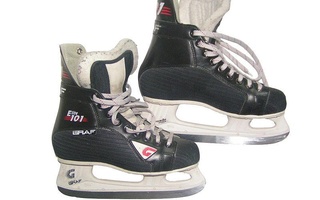 Free Ice-Skating, Right Here at Harvard
Free Ice-Skating, Right Here at Harvard -
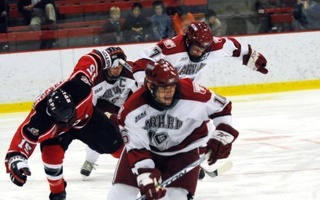 Women's Hockey Stars Showcase Skills at Lake Placid
Women's Hockey Stars Showcase Skills at Lake Placid -
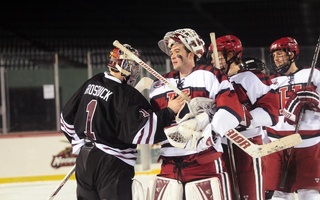 Michalek Provides Stable Footing on the Ice
Michalek Provides Stable Footing on the Ice -
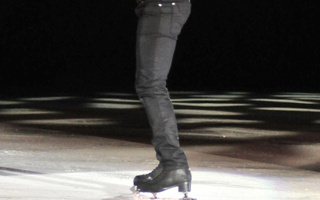 Stars, Students Skate for Cancer Fund
Stars, Students Skate for Cancer Fund -
Inconsistent Men's Hockey Falls Short of Illustrious Tradition“This is Harvard Hockey, A Tradition of Excellence.” The tag-line on Harvard men’s hockey’s media guide doesn’t leave much room for error.
-
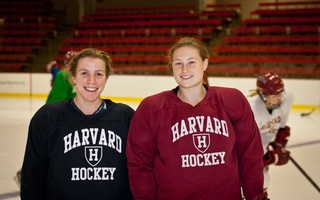 Crimson Skaters Will Take to the Ice in Sochi
Crimson Skaters Will Take to the Ice in Sochi













